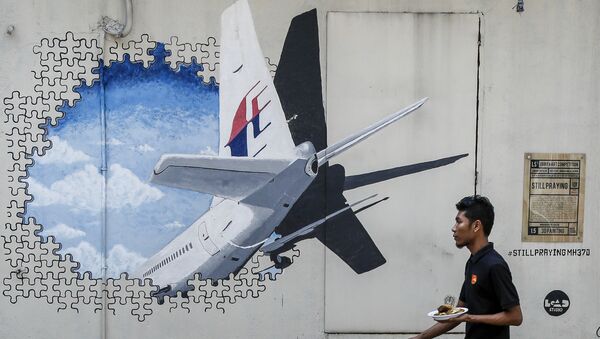Former United Airlines captain Ross Aimer, who is now CEO of Aero Consulting Experts, suggested the MH370’s cargo of 221 kilogrammes of lithium-ion batteries caused it to go down, Daily Star Online reports. According to the pilot, the outlet cites, a “hard shake” could have triggered a fire killing the passengers and crew during the flight from Malaysia to China just moments later. However, he claimed that the plane could have flown for hours until it ran out of fuel.
"It's a good possibility that if the fire consumed some of the aircraft but it was still flyable – because it's a huge airplane – the pilots and passengers were incapacitated and it flew until it ran out of fuel and just crashed into the ocean somewhere. Most probably these guys were on autopilot, and the autopilot just continued flying it”, he stated.
The expert said this type of fire can be easily provoked and is “almost impossible” to put out, even with the sophisticated fire suppression systems, the Boeing 777 has in its cargo hold.
"MH370 was only carrying 221kg of lithium-ion batteries on board this aircraft. But there is a very good possibility that if there was a fire, it was started by the lithium batteries… It could be as simple as a hard shake, when you're loading it you could technically start that thermal shock basically by either dropping it or overheating for some reason”, the aviator told the Daily Star.
According to him, several other fires in aviation had been linked to these batteries, including the UPS Boeing 747-400U crash close to Dubai 8 years ago, which killed two crew members. Following the investigation then, AE's General Civil Aviation Authority (GCAA) stated: "with reasonable certainty that the location of the fire was an element of the cargo that contained, among other items, lithium batteries".
Lithium-ion batteries are used in all kinds of electronic devices from mobile phones to laptops but have "a chance" of catching fire, the newspaper reports, citing a professor in Chemical and Biomolecular Sciences at UC Berkeley.
READ MORE: Newly Found Debris Marks 'Massive Breakthrough' in Search for MH370 — Report
Malaysia Airlines Flight MH370 with 239 passengers and crew on board disappeared from radar screens on 8 March 2014, on its way from Kuala Lumpur to Beijing. The Malaysian Transport Ministry and Australian Transport Safety Bureau concluded that the plane may have run out of fuel and crashed into the Indian Ocean off the Australian coast. However, an official investigation by the Malaysian government has failed to definitively determine the airplane's fate without having discovered the crash site.
Australia, Malaysia, and China called off their three-year joint search for the plane in January 2017 after failing to find any answers in the 120,000-square-kilometre underwater search zone that officials predicted would contain debris from the plane, which is presumed to have crashed somewhere.


